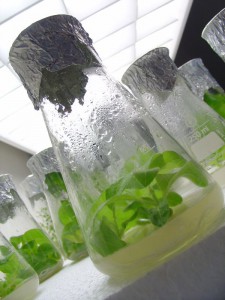 Our research interest lies at the interface of biological, chemical and physical sciences, focused on novel compounds biologically active in plants and animals. The activities of individual research groups are summarized on respective pages with links below.
Our research interest lies at the interface of biological, chemical and physical sciences, focused on novel compounds biologically active in plants and animals. The activities of individual research groups are summarized on respective pages with links below.
In the beginning, a group of phytochemists studied natural regulators of plant growth and division – purine-based cytokinins. Today, we are interested in identification of novel cytokinin metabolites in plants, routes of their synthesis and degradation, interaction with other signalling molecules as well as in the design of their more potent synthetic analogues with an application in crop science. Besides cytokinins, a wide range of other plant growth regulators are being explored, including auxins, derivatives of abscisic acid and brassinosteroids. The Bioanalytical Chemistry core supports the research with several HPLC systems coupled to mass spectrometers (ZMD 2000, Q-ToF micro and Quattro micro API by Micromass), able to quantify and identify not only such small organic molecules (like cytokinins or other plant hormones), but also to identify and sequence proteins.
 Only recently, after identification of enzymes involved in metabolism of cytokinins in plants, group of Plant Enzymology has started to explore the mechanisms of cytokinin degradation by cytokinin dehydrogenase. Current study deals with characterization of its physiological electron acceptor.
Only recently, after identification of enzymes involved in metabolism of cytokinins in plants, group of Plant Enzymology has started to explore the mechanisms of cytokinin degradation by cytokinin dehydrogenase. Current study deals with characterization of its physiological electron acceptor.
In 1990’s cytokinins have been found to non-specifically inhibit many protein kinases and soon their structures helped to prepare synthetic inhibitors of cyclin-dependent kinases. Joined effort of groups of Biomedicinal Chemistry and Bioorganic Chemistry is focused on the discovery of small molecule compounds targeted against the basic mechanisms of the pathogenesis of cancer, especially oncogenic protein kinases. The strategy is to study structure-activity relationships of active compounds and develop selective drugs that either block proliferation or induce apoptosis of cancer cells.
Many research tasks of either plant physiology, biochemistry or xenobiology require the application of radio-labelled compounds. Our synthesists are also able to prepare labelled compounds at specific sites for example with 3H or 14C. Such compouds are widely used as tracers for bioanalyses or markers for metabolic studies.
 Laboratory of Growth Regulators
Palacký University Olomouc
Laboratory of Growth Regulators
Palacký University Olomouc